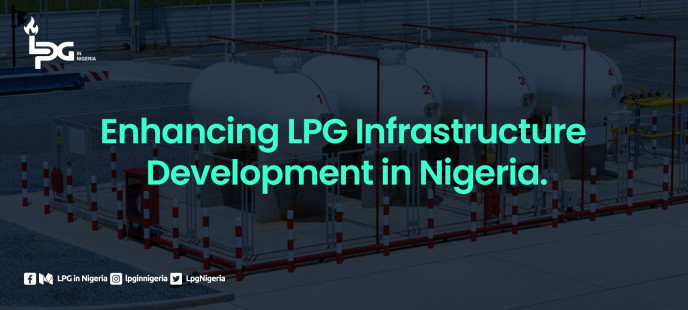- 4405
- 0
Sharing Ideas and Updates on LPG in Nigeria and related information to enable effective collaboration within the LPG Value Chain
Enhancing LPG Infrastructure Development In Nigeria

Liquefied Petroleum Gas (LPG) holds immense potential as a clean and efficient cooking fuel in Nigeria. However, the full realization of this potential is hindered by inadequate infrastructure, particularly in storage facilities, distribution networks, and refilling stations. This blog explores the challenges and opportunities surrounding LPG infrastructure development in Nigeria and discusses initiatives aimed at overcoming these obstacles.
Challenges:
Inadequate Distribution Networks: The distribution of LPG to remote and rural areas remains challenging due to poor road infrastructure, logistical constraints, and the high cost of extending distribution networks.
Inadequate distribution infrastructure poses significant challenges to the transportation and delivery of Liquefied Petroleum Gas (LPG) in Nigeria. The country lacks sufficient fleets of LPG transport trucks and railcars, leading to inefficiencies and delays in distribution. Moreover, the existing vehicles often suffer from poor maintenance, exacerbating transportation issues. These challenges are particularly pronounced in rural and remote areas, where distribution networks via trucks and rail are sparse, leaving many communities underserved and reliant on traditional, less efficient cooking fuels.
The condition of Nigeria's road infrastructure further compounds distribution challenges. Potholes, congestion, and inadequate signage are common issues, contributing to delays, accidents, and damage to LPG transport vehicles. Safety concerns are heightened due to the flammable nature of LPG, with accidents or spills posing risks of environmental damage, injuries, and loss of life. These road-related obstacles not only disrupt LPG supply chains but also increase transportation costs, making LPG less affordable for consumers, especially those in low-income households.
Moreover, Nigeria's inland waterways face constraints that limit the transportation of LPG via larger vessels. Low draft levels restrict vessel sizes, reducing economies of scale and increasing transportation costs. Navigational challenges, such as siltation and debris, further impede efficient transportation along waterways. Consequently, the potential of water-based distribution remains underutilized, hindering efforts to expand LPG accessibility across the country.
Safety Concerns: Safety standards in LPG infrastructure are sometimes lacking, leading to accidents, leaks, and incidents of unauthorized refilling. Poorly maintained facilities and inadequate training for personnel further exacerbate safety risks.
Opportunities:
Growing Demand: With increasing awareness of the health and environmental benefits of LPG, there is a growing demand for clean cooking fuels in Nigeria. This presents an opportunity for infrastructure expansion to meet the rising demand.
Government Support: The Nigerian government has recognized the importance of LPG as a clean energy source and has initiated policies and programs to promote its use. This includes subsidies, tax incentives, and regulatory reforms to attract investment in LPG infrastructure.
Private Sector Participation: There is significant interest from private sector players, including multinational energy companies and local distributors, in investing in LPG infrastructure projects. This presents an opportunity for public-private partnerships to accelerate infrastructure development.
Initiatives:
Expansion of Storage Facilities: Government and private sector partnerships can facilitate the construction of new LPG storage facilities, including depots and terminals, to increase storage capacity and ensure supply reliability.
Rural Outreach Programs: Targeted outreach programs can improve LPG accessibility in rural areas by establishing micro-distribution centers, promoting community-owned refilling stations, and providing subsidized LPG cylinders to low-income households.
Safety Awareness Campaigns: Public awareness campaigns on LPG safety and proper usage can help mitigate safety risks associated with infrastructure. This includes training programs for LPG operators, awareness campaigns for consumers, and regulatory enforcement to ensure compliance with safety standards.
Addressing the challenges and seizing the opportunities in LPG infrastructure development is essential for unlocking the full potential of LPG as a clean cooking fuel in Nigeria. By investing in storage facilities, expanding distribution networks, and enhancing safety standards, Nigeria can improve LPG accessibility, promote sustainable development, and improve the livelihoods of its citizens. Collaborative efforts between government, private sector stakeholders, and civil society are crucial for achieving these objectives and ensuring a sustainable energy future for Nigeria.
We value your input and insights! We're eager to hear from our readers, so don't hesitate to share your thoughts and opinions on the topic at hand. Your feedback is invaluable to us and helps ensure that we cover all aspects comprehensively.
Also, don't forget to explore our marketplace on our platform for all things related to LPG. Whether you're looking for information, products, or services, our marketplace is your go-to destination. From LPG equipment and accessories to industry news and expert advice, we've got you covered.
Your engagement and support drive us to continually improve and provide you with the best possible experience. So, join the conversation, share your thoughts, and explore the marketplace for all your LPG needs. We look forward to hearing from you!
















0 Comment.